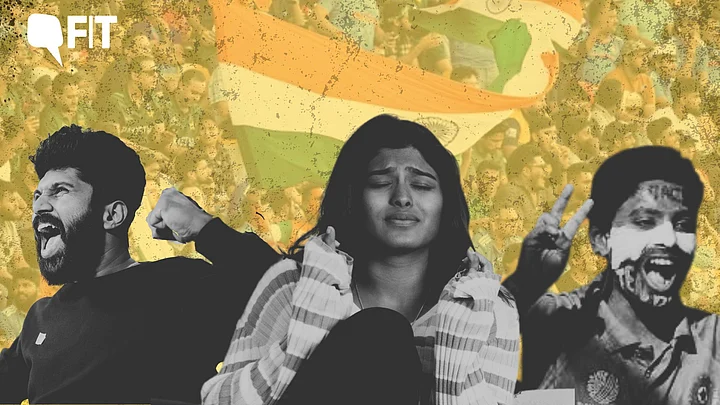I turn the television off. Five minutes later, I turned it on again.
Off. On. Off again.
It's the Men's ODI Cricket World Cup semi-finals. India is playing New Zealand and the match was stuck in limbo. It could have gone either way.
The stakes are high. The room is tense. I am stressed, and I can't decide if I want to watch a heartbreaking defeat, or risk missing a glorious victory.
I decide to watch. It's gruelling torture. But ultimately, India wins.
The room errupts in celebration, there's shouting and hugging and sighs of relief, to a backdrop of firecrackers going off in my colony (being in Delhi, this, we could have done without).
This euphoria of victory feels so personal and so palpable, I even wake up the next day with a spring in my step, when normally I'd have been dragging my feet. And it's not just me, online and offline, jubilation is all around me.
None of us had anything to do with the win, but all of us are in on it.
Spectator sports have always invoked strong feelings. The joy, the vicarious triumph, the devastation, and even the unbridled anger are very real emotions that fans of team sports are all too familiar with — Just ask any fan of football.
But, why is that?
Why do we feel so strongly about matches and games, the outcome of which has no real-world impact on our lives whatsoever?
Sports, Hormones, and Online Support Groups: Why Do We Care So Much?
"If your team is winning, your country is winning, people take the wins personally. As a result of this, happy hormones are released, which makes them feel euphoric," says Dr Rituparna Ghosh, Clinical Psychologist at Apollo Hospital, Mumbai.
The hormones in question include dopamine, endorphins, and even some cortisol (a stress hormone). According to a study conducted in Spain, even just watching sports releases testosterone in both men and women.
So, although it feels silly to someone on the outside, if you're invested in sports, there are real physiological responses to the stimulus which manifest as real emotions.
What happens when the team you support loses, or is on a losing streak?
"They take it in the same way, personally. That leads to the negative part of the stress which causes distress," says Dr Ghosh.
So the team’s defeat feels like a personal defeat, leaving people distraught, dejected, and angry with no real avenue to release these emotions because the situation is entirely outside their control.
In many, the grief can even cause depression for a few days after.
It’s so common that if you Google ‘how to cope with your team losing’, or ‘post match depression’, you’ll get an overwhelming number of results for Reddit threads and communities dedicated to discussing just that.
Beyond Sports: A Sense of Community
The phenomenon is interesting because it extends beyond just how invested you are in that particular sport. It can, in some ways, be traced all the way back to a primal social need for a sense of community and even 'finding meaning', say anthropologists.
In the modern world, more often than not, humans find connections through communities built around shared interests. So sports and other collective activities, have transcended the status of leisure activity.
The team we support slowly starts becoming entwined with our identities, and gives us a sense of belonging, says Dr Divya Jain, Sport & Counselling Psychologist, at Fortis Healthcare, Gurugram.
"In the World Cup, it's our national team, but this also happens in football and the Super Bowl wherein a country is not involved," she adds.
And a collective identity can be a strong driving force for our emotions.
"When large crowds of people come together with a singular focus, there is a deindivisualisation that happens where you tend to become one with the crowd. This can also lead to hightened emotions, and even extreme actions."Dr Divya Jain
There is also such a thing called the 'social identity theory' that explains a team winning or losing can mean so much to some poeple.
How we feel about ourselves is based to a degree on our accomplishments— those we achieve ourselves as well as those achieved by the groups to which we belong. In other words, if you belong to a group or organisation which is successful or respected you will tend to feel better about yourself.
The sports teams you support make you feel that way, "like a part of them is winning," says Dr Rituparna Ghosh.
Ask Yourself, Is It Getting Out of Control?
If harnessed right, following the exploits of your favourite team or even player can help boost your own self-esteem, make you feel motivated, provide shots of happy hormones now and then, and give you something to take your mind off the everyday drudgery of life, says Dr Peter Keelan, a US-based psychotherapist, in his online blog.
However, there is also a flip side to it. The psychological distress can have a significant impact on your mental health, sometimes lead to extreme outcomes, and even spill over to your interpersonal relationships, says Dr Ghosh.
"I have seen people going to the extent of harming themselves because of their favourite team losing, or their favourite player not scoring well."Dr Rituparna Ghosh
"People sometimes go so deep into it that they start bringing up religion, and race and making personal attacks too," she explains.
"It can also ruin interpersonal relations with friends and family who might be supporting other teams, or simply belong to the country of rival teams."Dr Rituparna Ghosh
So, at the end of the day, say the experts we spoke to, as long as you are aware that it's just a sport, you have the tools to deal with the feeling of loss (just like with victory), you're good, and it's not hampering your mental peace or that of others around you, you're good.

